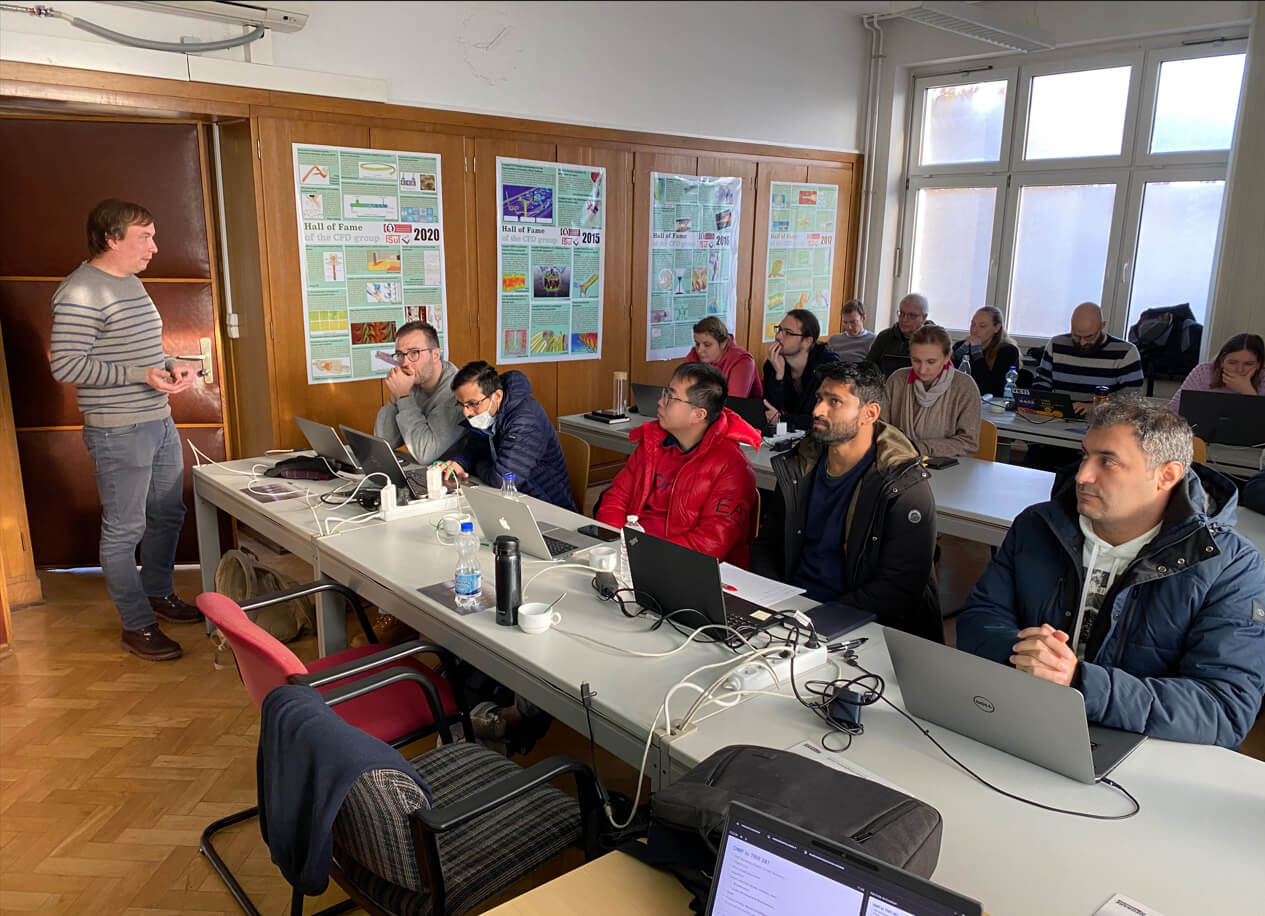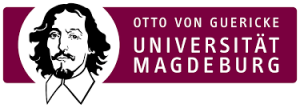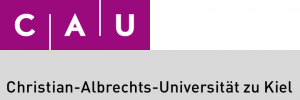News
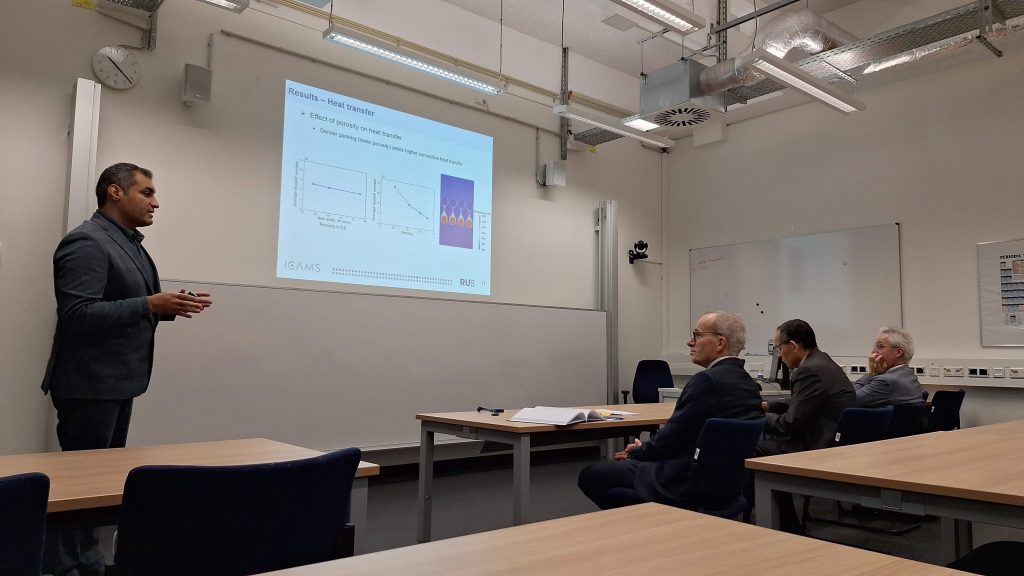
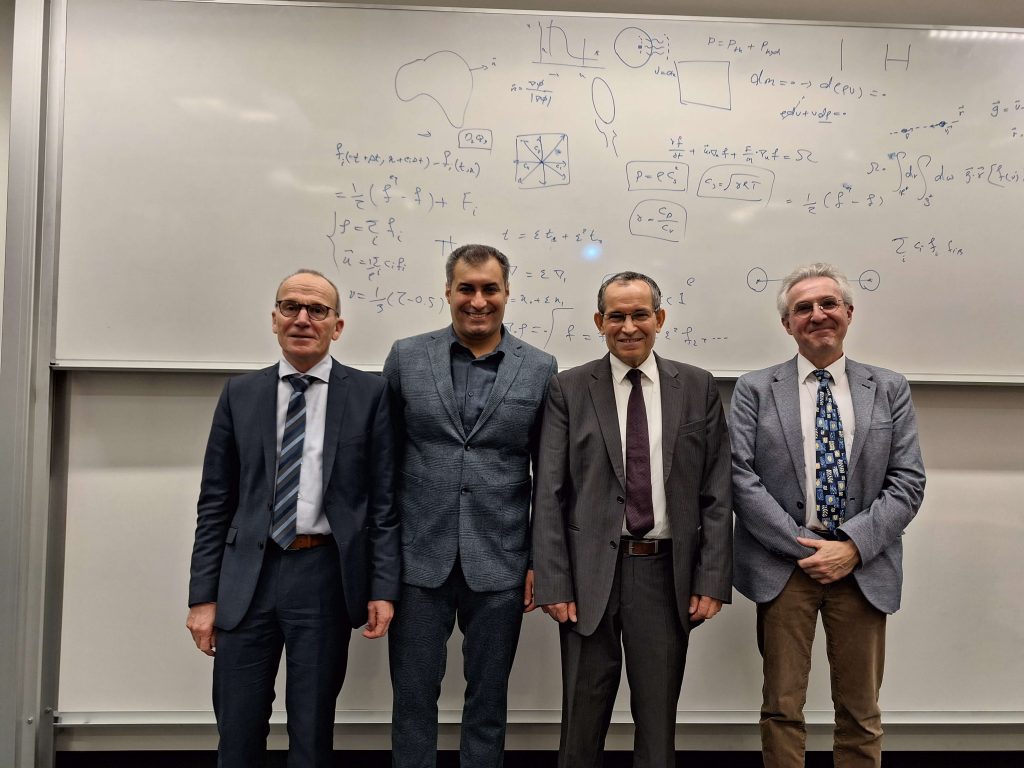
Dec. 12th, 2025, Bochum, Germany
PhD Defense of Reza Namdar (CRC 287)
Reza Namdar, a member of CRC 287, successfully defended his PhD thesis entitled “Numerical Study of Reactive Flows in Packed Beds using a Monolithic Hybrid Lattice Boltzmann–Finite Difference–Phase Field Model.” The defense took place on Friday, 12 December 2025, at 10:00 a.m. in IC 02/722 at Ruhr University Bochum. The event consisted of a 30-minute presentation, followed by a one-hour examination by the doctoral committee.
The PhD work was supervised by Prof. Fathollah Vornik, with Prof. Dominique Thevenin as second supervisor. The examination committee was chaired by Prof. Viktor Scherer.
Article
Latest Publications:
Nov. 6th, 2025, Particuology
Title: Tabulation applied to thermal conduction within complex particle geometries in the Discrete Element Method.
Authors: Bergold, T. Illana. E., Scherer, V
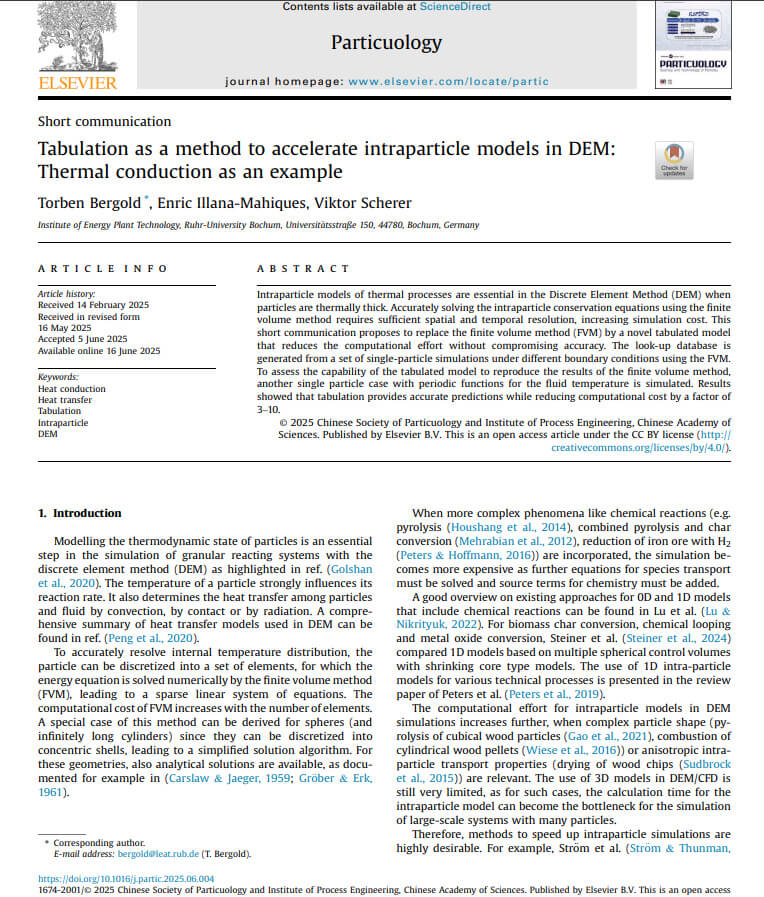
Jul. 10th, 2025, Particuology
Title: Tabulation as a method to accelerate intraparticle models in DEM: Thermal conduction as an example.
Authors: Bergold, T. Illana. E., Scherer, V
Article
Jul. 10th, 2025, International Journal of Energy for a Clean Environment
Title: Experimental investigation of reflection phenomena in a simplified packed bed using pixel-resolved temperature distribution.
Authors: M. Tyslik, M. Schiemann.
Article
Jul. 10th, 2025, International Journal of Energy for a Clean Environment
Title: Numerical Study on Residence Time and Contact Heat Transfer of Spherical Particles on a Continuously Operated Hearth Furnace Floor using the Discrete Element Method (DEM).
Authors: N. Hilse, V. Scherer.
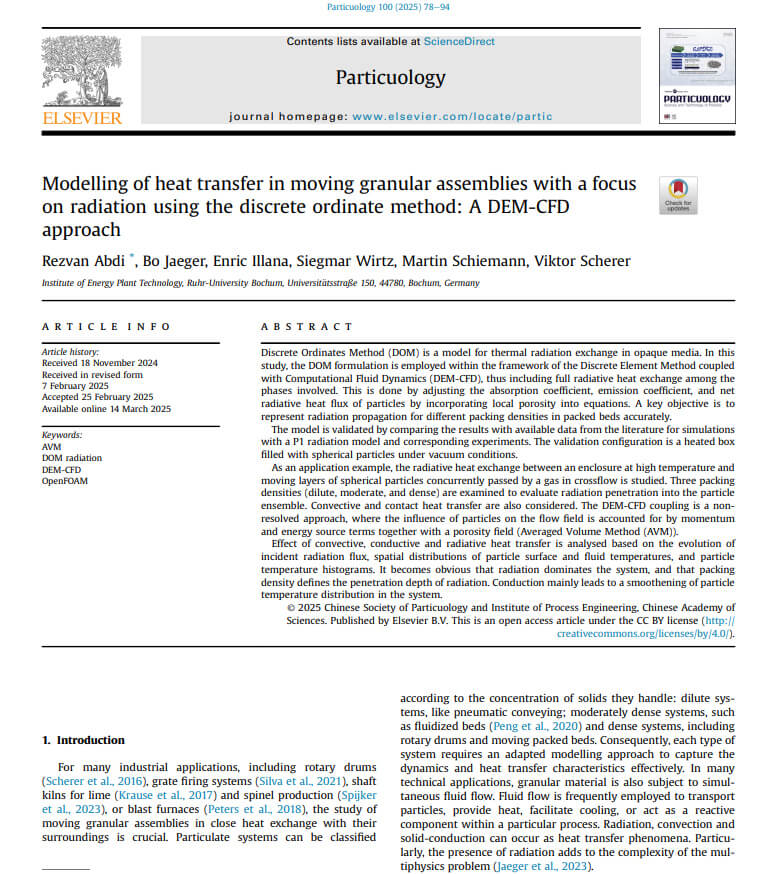
Feb. 25th, 2025, Particuology
Title: Modelling of Heat Transfer in Moving Granular Assemblies with a Focus on Radiation using the Discrete Ordinate Method: A DEM-CFD Approach.
Authors: R. Abdi, B. Jaeger, E. Illana, S. Wirtz, M. Schiemann, V. Scherer
Direct download link: Abdi et al., Particuology, 2025.
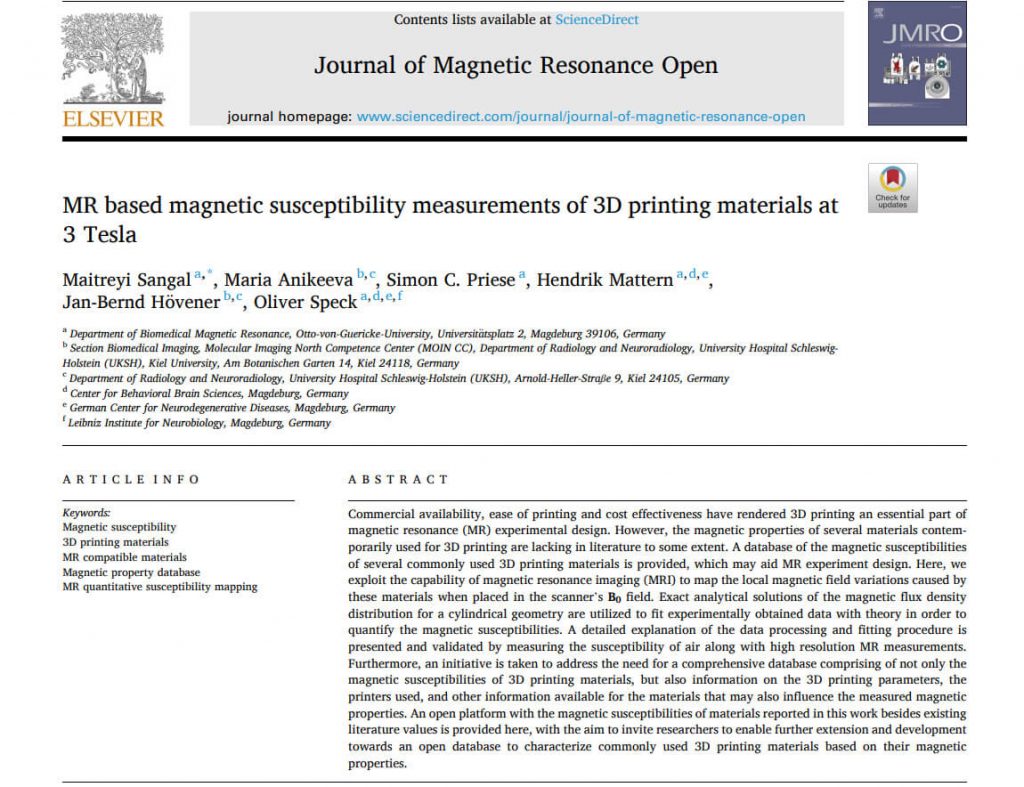
Award for CRC 287 Project A2 Paper
Oct. 27th, 2025
JMR/JMRO “New Voices in Magnetic Resonance” Award for CRC Project A2 Paper
We are delighted to announce that the paper “MR based magnetic susceptibility measurements of 3D printing materials at 3 Tesla”, conducted as part of CRC 287 sub-project A2, has been selected among the top three articles in the JMR/JMRO joint Special Issue “New Voices in Magnetic Resonance.”
This recognition highlights the outstanding quality and impact of the work, which has been honored with a $500 award. The study, published in 2023, introduces a magnetic resonance imaging–based approach to accurately measure the magnetic susceptibilities of commonly used 3D printing materials at 3 Tesla and establishes an open database to support MR experimental design.
The award will be formally presented during the JMR/JMRO/ISMAR Virtual Symposium on December 4th, 2025, where the prize recipients will give invited lectures.
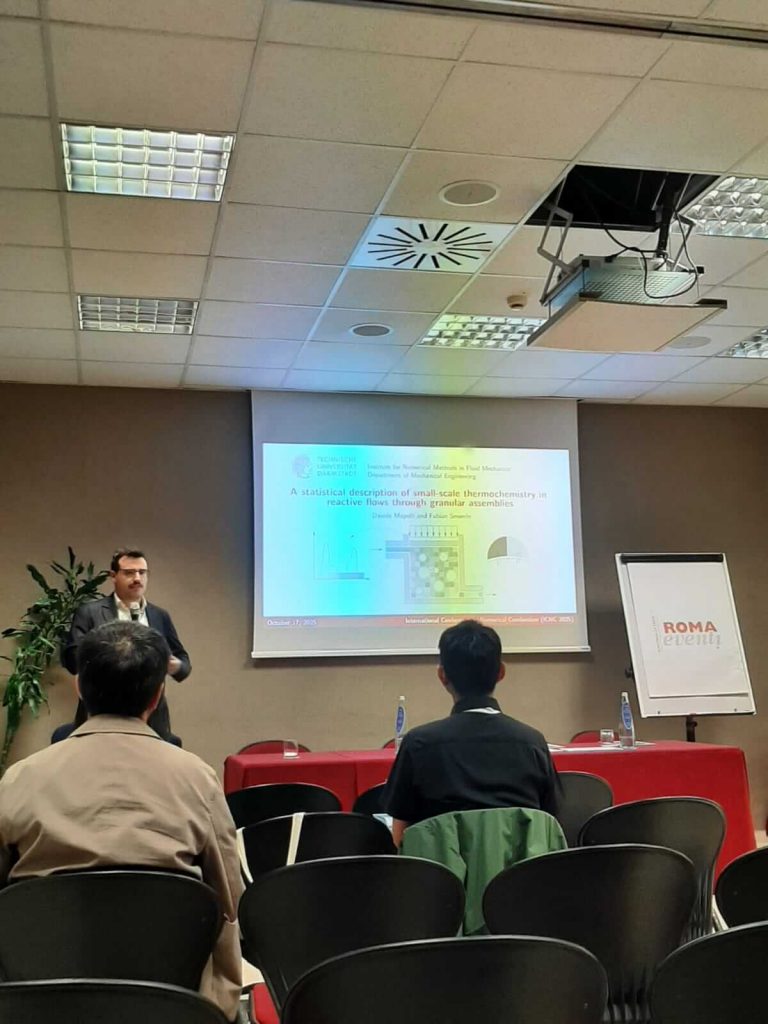
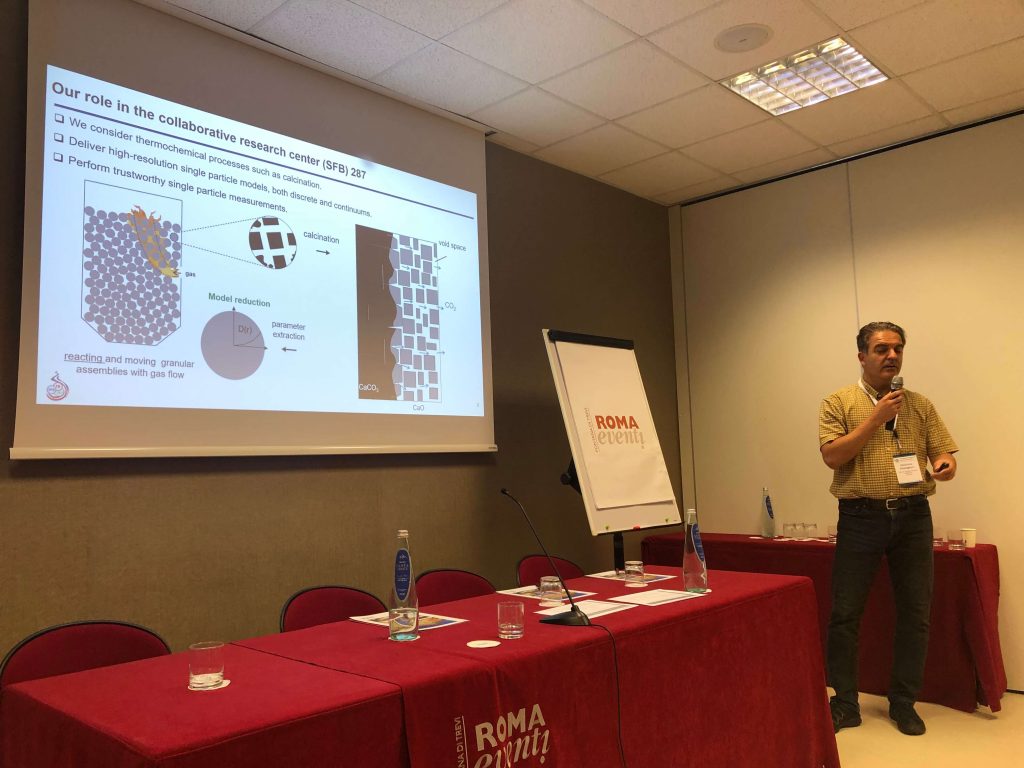
Oct. 14th–17th, 2025, Rome, Italy
Mini-Symposium on “Recent Advances in DEM–CFD Descriptions of Reacting Particle–Gas Systems”
At the Numerical Combustion Conference in Rome, the Collaborative Research Centre (CRC) is organizing a focused Mini-Symposium dedicated to recent developments in the coupled Discrete Element Method DEM–CFD modeling of reacting particle–gas systems. The abstract is provided below:
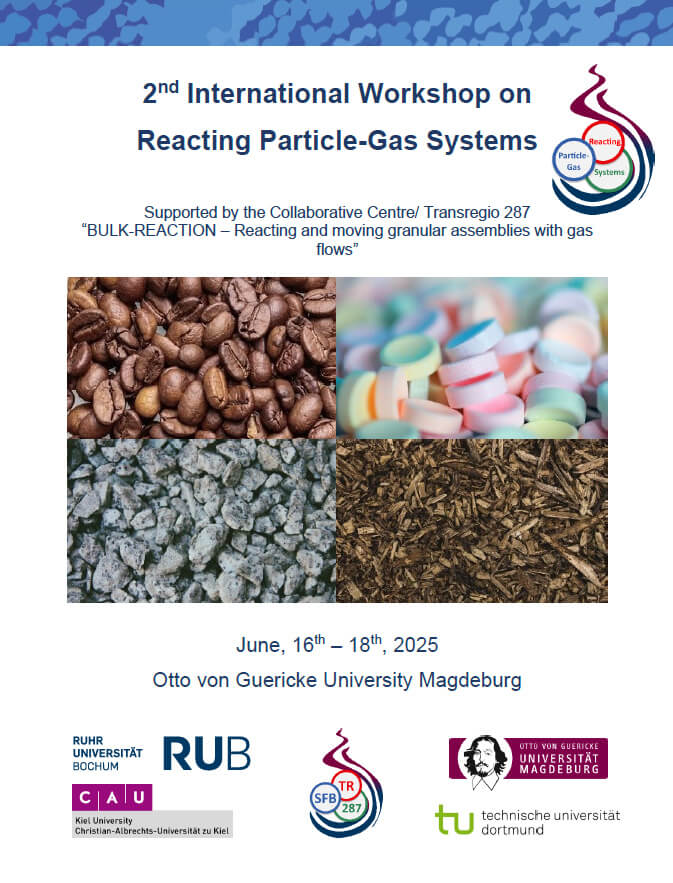
Sep. 1st, 2025.
Book of Abstracts Published
The Book of Abstracts for the International Workshop on Particle-Gas Systems 2025 has now been published and is available online.
👉 Access the Book of Abstracts (DOI: 10.25673/118928)
More information related to the workshop: click here
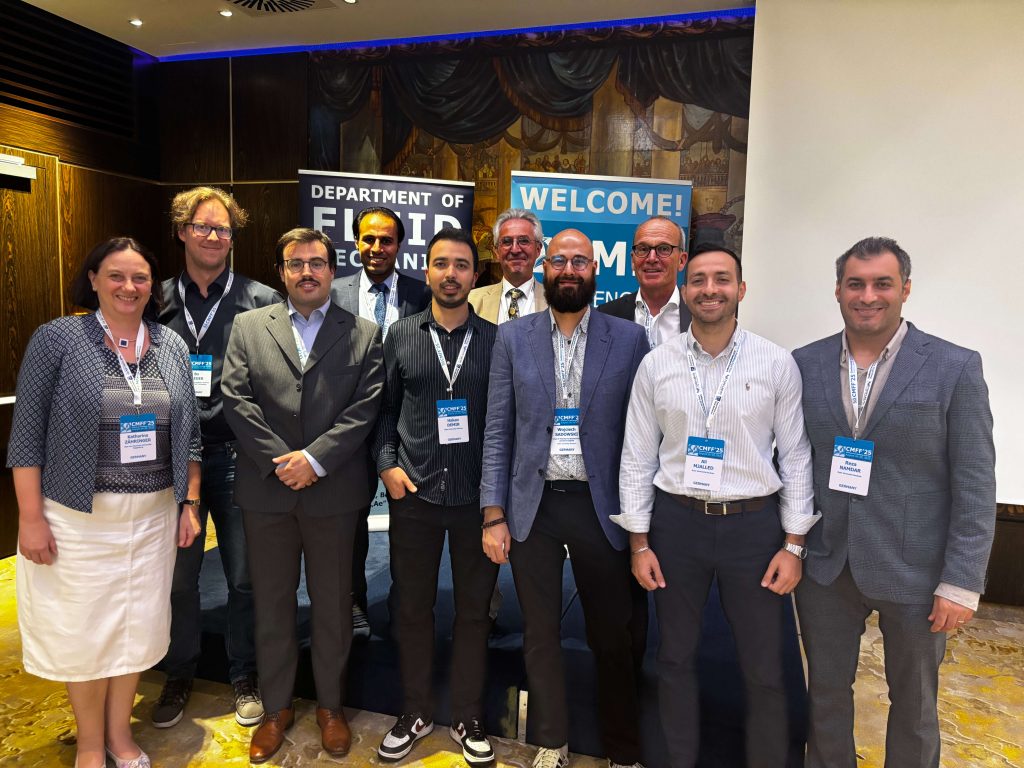
Conference
(CMFF’25)
Aug. 26th–29th, 2025.
CRC 287 at the Conference on Modelling Fluid Flow (CMFF’25)
From 26–29 August 2025, CRC 287 contributed to the Conference on Modelling Fluid Flow (CMFF’25) in Budapest, Hungary, by organizing a dedicated workshop session on
“Coupling Discrete Element Method and Computational Fluid Dynamics (DEM/CFD).”
The session, led by Prof. Viktor Scherer (Ruhr-University Bochum) together with Prof. Dominique Thévenin (Otto von Guericke University Magdeburg), provided a broad perspective on the modeling of particulate flows, with a strong focus on combining DEM and CFD approaches. Discussions highlighted the challenges of simulating reacting flows, the importance of experimental validation in complex geometries, and novel trends such as machine learning for model enrichment, hybrid resolved/unresolved DEM/CFD strategies, and advances in Immersed Boundary Methods.
CRC 287 members and collaborators presented a series of contributions, including:
Rezvan Abdi, Bo Jaeger, Torben Bergold, Enric Illana, Martin Schiemann, Viktor Scherer
Influence of packing density on the calcination process for lime production: A DEM-CFD studyNinghua Zhan, Enqi Liu, Andrea Dernbecher, Nicole Vorhauer-Huget, Rui Wu, Alba Diéguez Alonso, Abdolreza Kharaghani
Detailed characterisation of pore structure and transport properties of biomass particles during pyrolysisAli Mjalled, Bo Jaeger, Reza Namdar, Lucas Mieg, Enric Illana, Fathollah Varnik, Viktor Scherer, Martin Mönnigmann
Enhancing DEM-CFD simulations with machine-learning-based locally resolved Nusselt number correlationsDavide Mapelli, Don Dasun Attanayake, Berend van Wachem, Fabian Sewerin
Combining the partially stirred reactor with a DEM description: The pyrolysis of biomassBo Jaeger, Rezvan Abdi, Enric Illana, Viktor Scherer
Investigating the influence of particle shape on the pyrolysis of thermally thick particles in DEM/CFDReza Namdar, Mohammad Norouzi, Fathollah Varnik
An application of machine learning to compute thermochemistry of reactive flows: A mixture of experts approachWojciech Sadowski, Christin Velten, Maximilian Brömmer, Hakan Demir, Francesca Di Mare, Katharina Zähringer, Viktor Scherer
Numerical and experimental investigation of low Reynolds number flow in a packed bed of rotated bars
Farshad Gharibi, Dominique Thévenin
Equilibrium positions and dynamic behavior of thermal prolate particles in shear flow: Influence of particle size.
The workshop was well attended and fostered fruitful discussions on current advances and future challenges in DEM/CFD simulations.
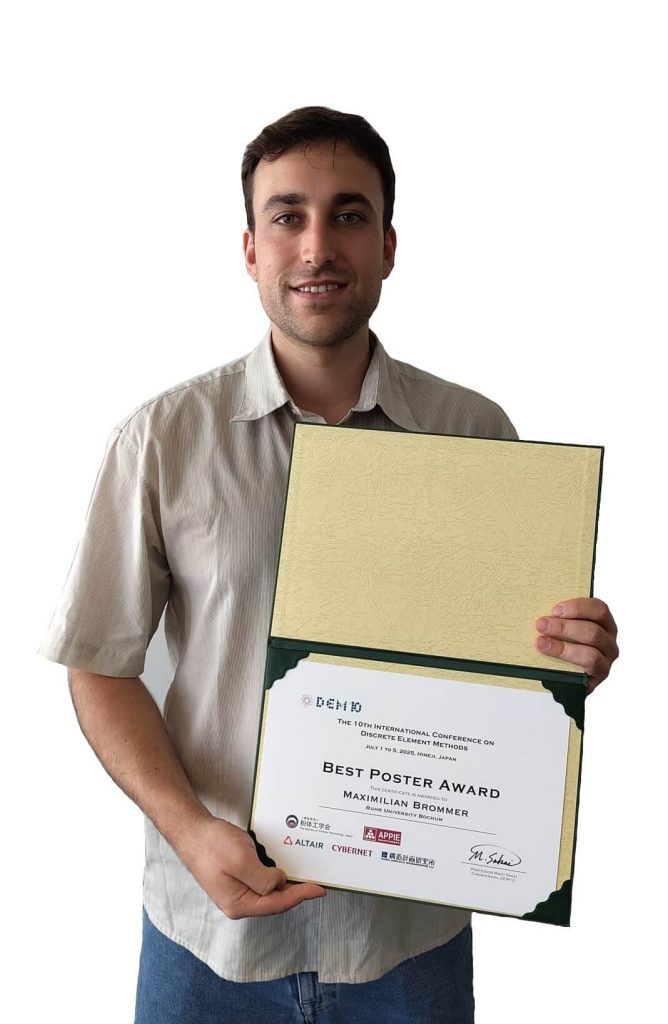
Aug. 10th, 2025.
Maximilian Brömmer Wins Best Poster Award at DEM10 in Japan
M.Sc. Maximilian Brömmer (Project C7, Bochum) was awarded with the Best Poster Award for his presentation at the 10th International Conference on Discrete Element Methods (DEM10) in Japan.
His poster was entitled Transition between 1D and 3D intraparticle representation for heat transfer in DEM-CFD simulations.
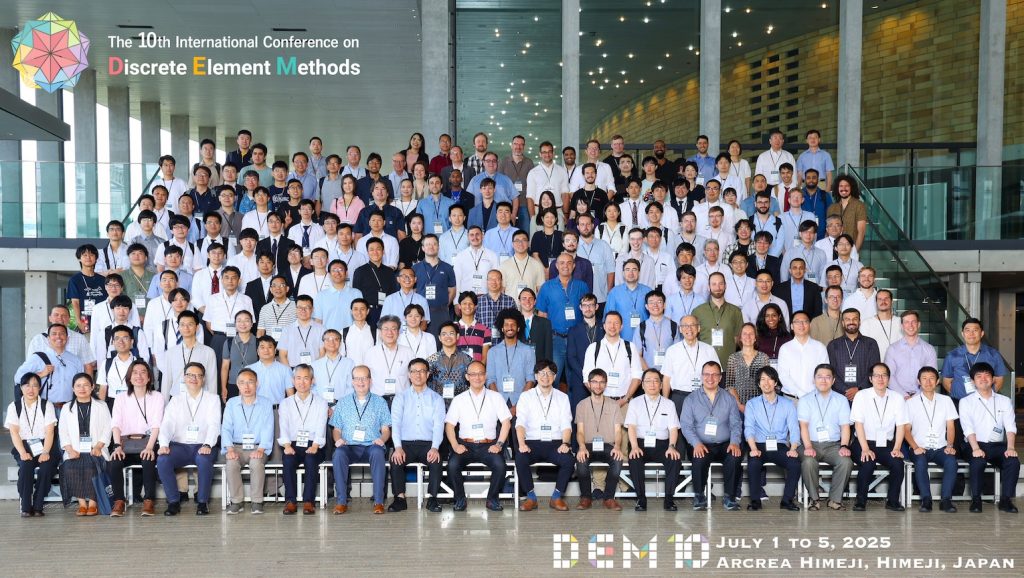
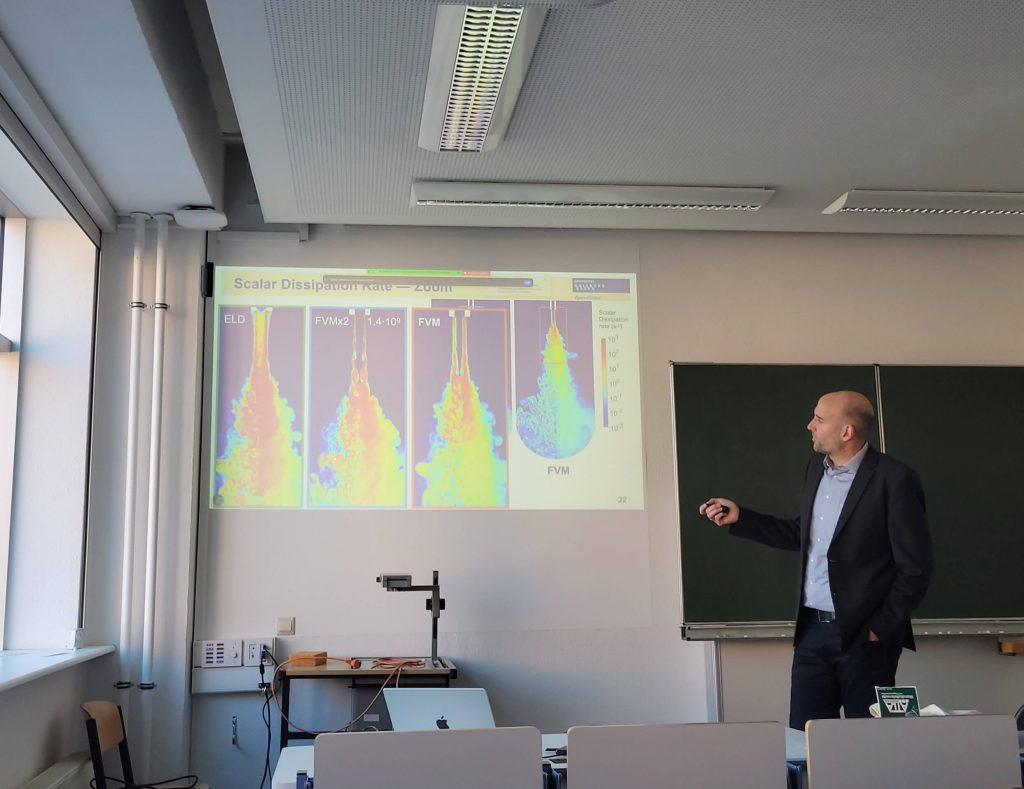
Apr. 1st, 2025.
Prof. Kempf Presents Novel Approach to Fluid Mixing Simulation at OVGU Magdeburg
On Tuesday, April 1st, 2025, we had the honor of hosting Prof. Kempf from the Chair of Fluid Dynamics at Universität Duisburg-Essen, who collaborates closely with our A5 group led by Fabian Sewerin at OVGU Magdeburg. His captivating talk covered:
“A Scale-Dependent Euler-Lagrangian Decomposition for Simulating Mixing at High Schmidt and Prandtl Numbers”
Prof. Kempf provided a novel approach to model fluid mixing behavior, demonstrating how it enhances accuracy compared to traditional FVM while also significantly reducing computational costs. The discussion highlighted the potential of this method in capturing complex transport phenomena more efficiently, attracting great interest among researchers and students.
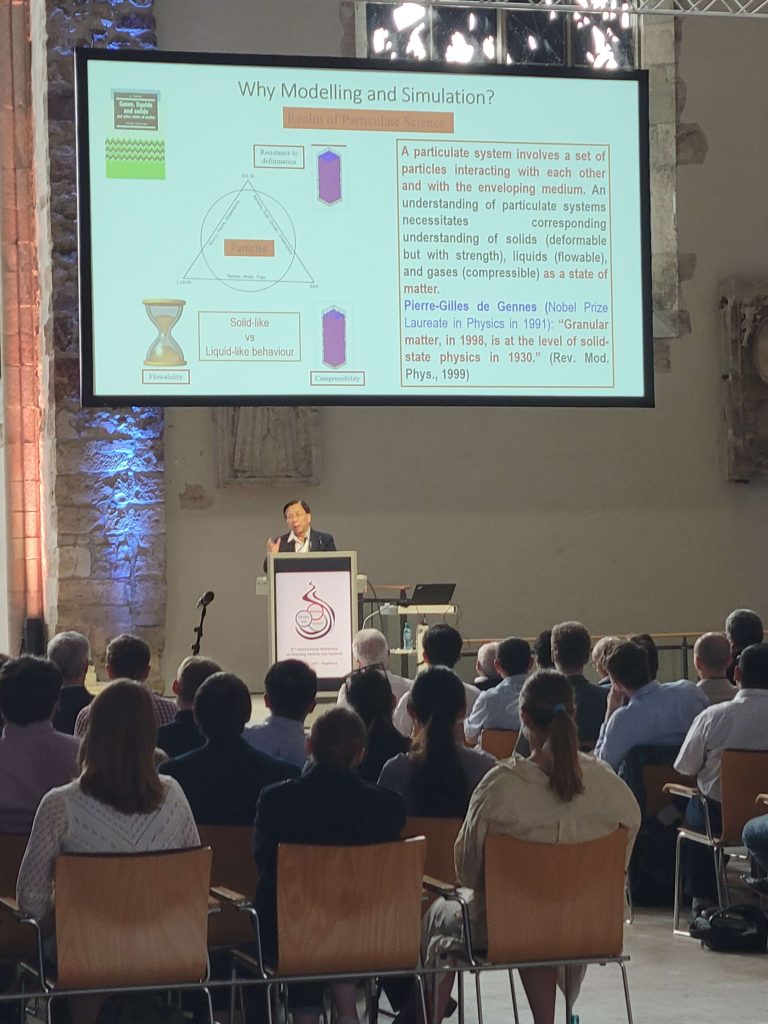
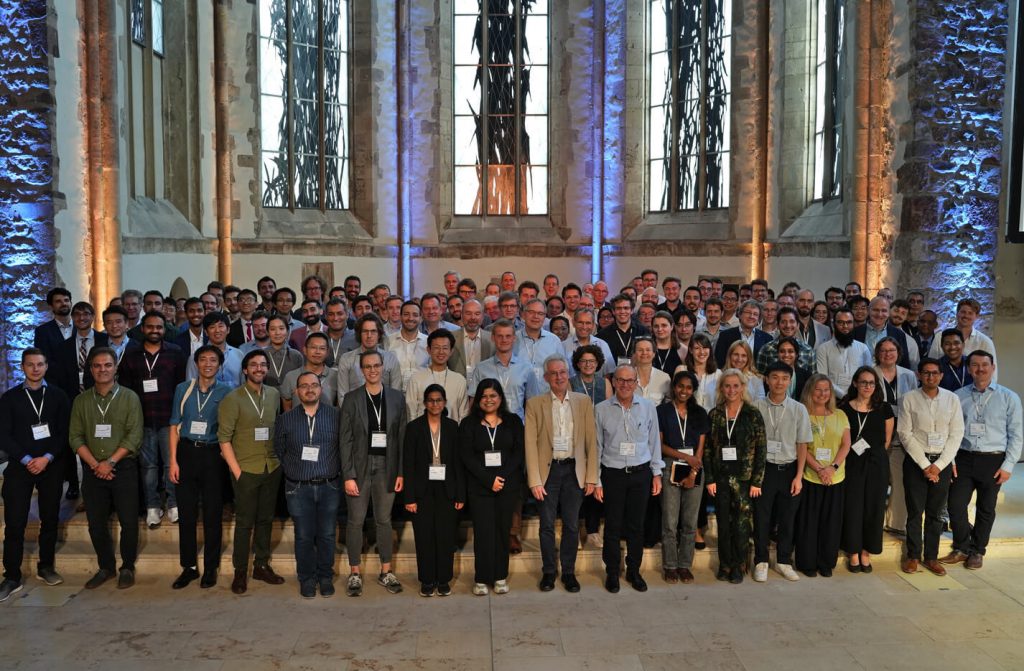
Jun. 16th–18th, 2025, Mageburg, Germany:
2nd International Workshop on Reacting Particle-Gas Systems
The 2nd International Workshop on Reacting Particle–Gas Systems was held in Magdeburg from 16 to 18 June 2025. Hosted by CRC 287 BULK REACTION, the event attracted over 140 participants from universities, research institutions and industry to the historic Johanniskirche, which provided an inspiring setting for scientific exchange in reactive multiphase systems.
The scientific programme covered a wide range of topics related to particle-laden reactive flows, including detailed and reduced single-particle reaction models, gas-phase combustion and large-scale CFD/DEM simulations. There was a particular focus on integrating experimental and numerical methods, with sessions dedicated to advanced diagnostics as well as benchmarking and validation strategies. This interdisciplinary approach encouraged collaboration between simulation experts and experimentalists.
Keynote lectures were delivered by internationally renowned researchers Aibing Yu, Tamas Turanyi, Tina Kasper, and Berend van Wachem, providing highlights of the workshop.
A poster session enabled the presentation of ongoing research and emerging results. The diverse scientific backgrounds of the participants contributed to lively discussions and collaborations.
To ensure a lasting impact, a book of abstracts with a DOI will be published, and selected participants were invited to submit full-length contributions to a special issue of Particuology due to be published soon.
Thanks to its high level of attendance and the quality of the science presented, the workshop advanced research in reacting particle–gas systems and strengthened an international network of experts dedicated to this complex and rapidly developing field.
Workshop website:
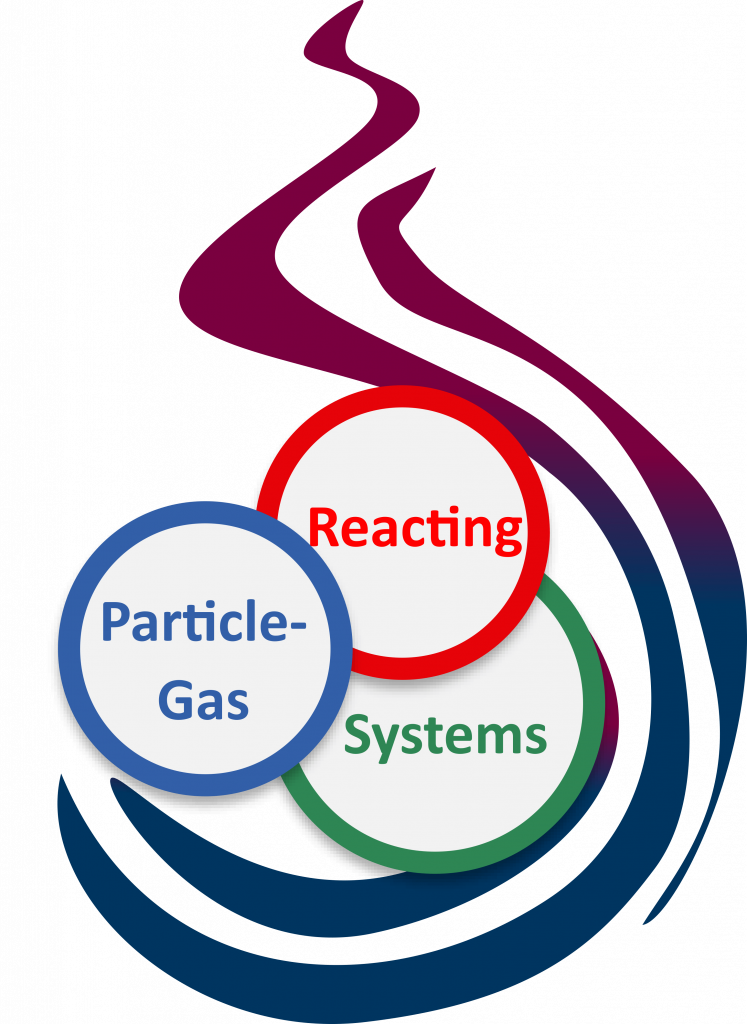
Apr. 1st, 2025.
First industrial user for the CRC 287 Bulk-Reaction open-source DEM-CFD framework
thyssenkrupp Polysius is the first industrial user of the open-source DEM-CFD framework developed within the Corporate Research Center Center 287 Bulk-Reaction. The company is utilizing this DEM-CFD framework to simulate the flight and conversion behavior of refuse-derived fuels (RDF) in cement rotary kilns. These fuels have a size range of several centimeters and complex particle shapes. For such thermally thick particles, the DEM approach is well-suited to describe the physical and chemical intra-particle processes. When coupled with OpenFOAM as the CFD solver, this approach also enables the accurate simulation of the flight behavior of these complex-shaped particles.
About thyssenkrupp Polysius (copy from the thyssenkrupp webpage)
As a partner and a full range-supplier of the cement industry, we are leading the way to a more sustainable cement business. Providing green tech, digital and automation solutions, on-site and remote services, we are the number one partner for our customers whether in new build plants, products and machines or services. With solutions such as polysius® pure oxyfuel as the game-changing solution for carbon capture and storage/usage (CCU, CCS), we are able to offer groundbreaking tools to transform the industry – even today!
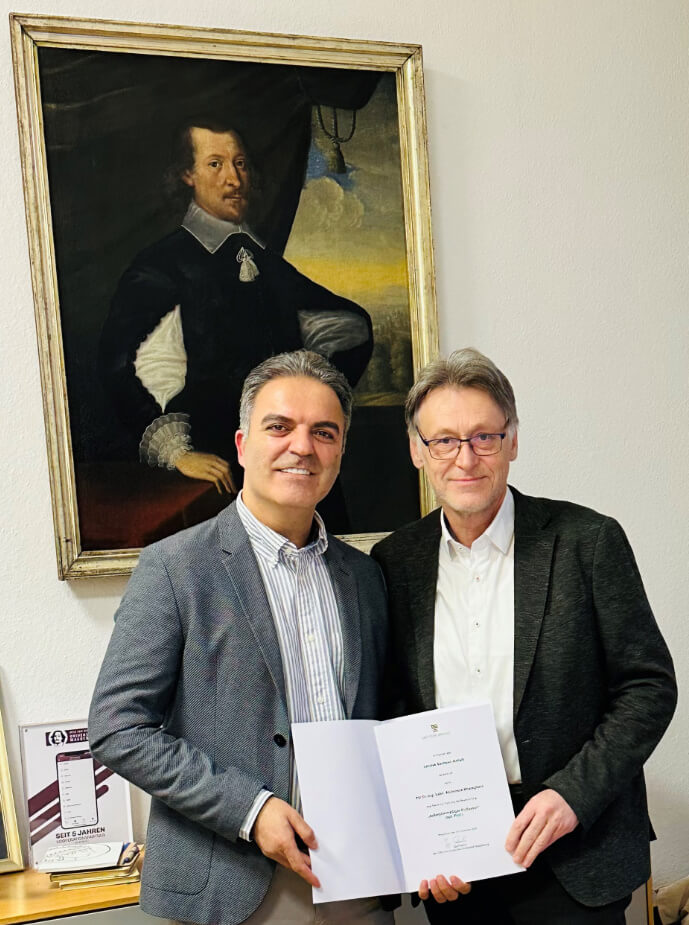
Dec. 6th, 2024.
Award of the Title „extraordinary professor“ to CRC Member apl. Prof. Dr.-Ing. habil. Reza Kharaghani
On December 4, 2024, Prof. Dr. Jens Strackeljan, President of Otto von Guericke University Magdeburg, awarded apl. Prof. Dr.-Ing. habil. Reza Kharaghani the title “Extraordinary Professor.” Dr. Kharaghani, the principle investigator of project B4 within SFB/TRR 287, has been leading the Drying and Pore Networks Group at the Faculty of Process and Systems Engineering, Otto von Guericke University Magdeburg, since 2013.
The CRC congratulates Dr. Kharaghani on this recognition!
Online Article
Nov. 26th, 2024.
New Online Article in RUBIN, the science magazine of the Ruhr University Bochum, published.
Researchers from the Collaborative Research Center Bulk Reaction have set out to understand how the heat distribution in large-scale industrial furnaces affects the products inside. This should aid the energy transition.
Read more:
https://news.rub.de/wissenschaft/2024-11-26-computersimulation-effizient-erwaermt
https://news.rub.de/english/2024-11-26-computer-simulation-heating-efficiently

Oct. 7th, 2024.
Dr. Martin Schiemann Awarded the Title of Apl. Professor
Dr. Martin Schiemann, principal investigator of projects B3 and C3 within BULK-Reaction, has been honored with the title of apl. Professor.
Dr. Schiemann studied physics at the University of Bochum and earned his Dr.-Ing. degree in 2012 with a thesis on the spray roasting of iron chloride solutions. His habilitation follwed in the year 2018 with a thesis on optical thermography for engineering applications.
He also serves as a principal investigator in the SFB/TRR 129 Oxyflame, focusing on oxy-fuel combustion of biomass. Additionally, his research interests extend to metal fuels, a key area of his scientific work.
The CRC congratulates Dr. Schiemann on this great achievement, which highlights his exceptional contributions to BULK-Reaction and his broader scientific impact.
(Workshop)
Sep. 26th, 2024.
1st doctoral researcher’s self-organized workshop in funding period 2
The first doctoral researcher’s self-organized workshop in funding period 2 took place in Bochum in September 2024. It included a data-sprint to foster RDM best practices. There was a guest lecture by Anika Weber (PhD student at DLR) on the topic of Development, Modelling, and Experimental Investigation of a New, Innovative Particle Concept for Solar Fuel Production.
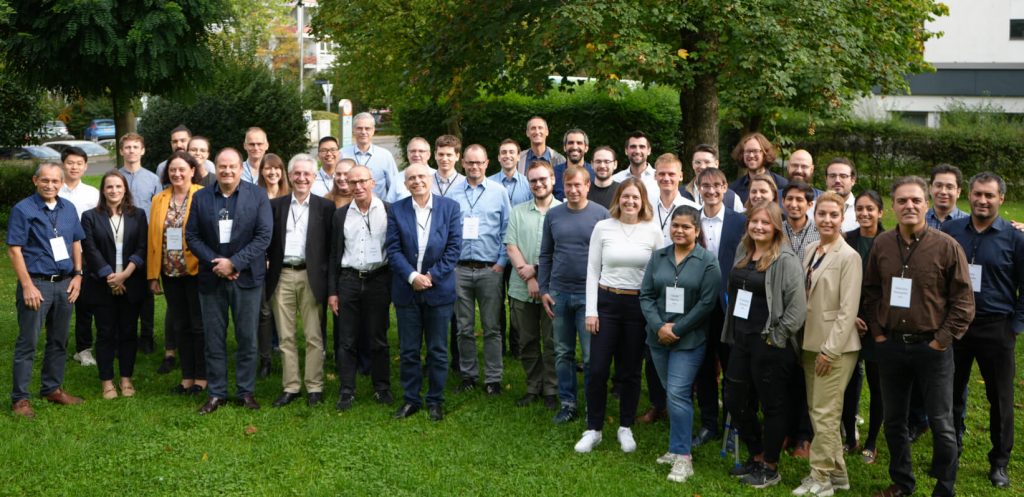
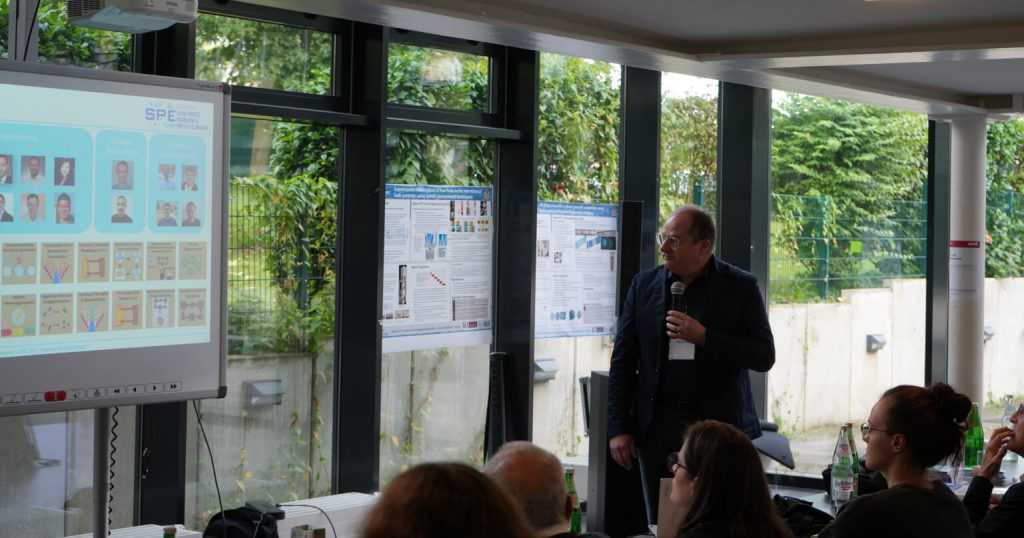
Sep. 24th–25th, 2024.
3rd Retreat of the CRC/TRR 287 BULK-REACTION in Bochum
The 3rd Retreat of the CRC/TRR 287 BULK-REACTION took place in Bochum in September 2024. It was the first in-person meeting of all CRC members after the 2nd funding period was granted by the DFG in may this year. The team discussed the current status and the strategic orientation of the CRC and a group of new PhD students was welcomed. Prof. Stefan Heinrich (TU Hamburg), invited guest speaker, held a key note lecture about reactive fluidized beds, presenting state-of-the-art measurements techniques in the field of particle technology and giving insight into a topic that is of great interest to the CRC.
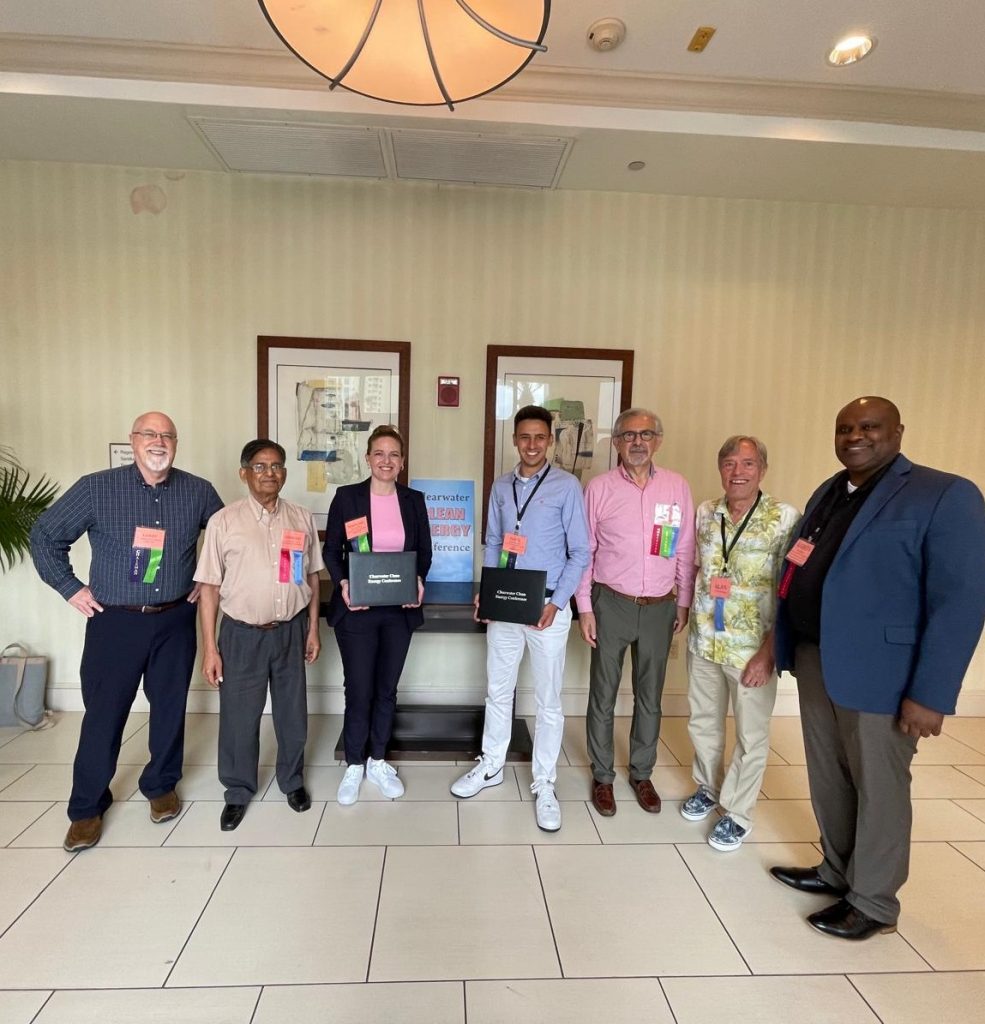
Jun. 19th, 2024.
Nikoline Hilse Receives Best Student Paper Award Recognition at Clearwater Clean Energy Conference
M.Sc. Nikoline Hilse (project C3, Bochum) was awarded ‘The First Runner Up’ in the best student paper award competition for her contribution with the title “Numerical Study of Residence Time and Contact Heat Transfer of Spherical Particles on a Continuously Operated Hearth Furnace Floor Using the Discrete Element Method (DEM)” at the 48th International Technical Conference on Clean Energy, Clearwater, Florida, USA.
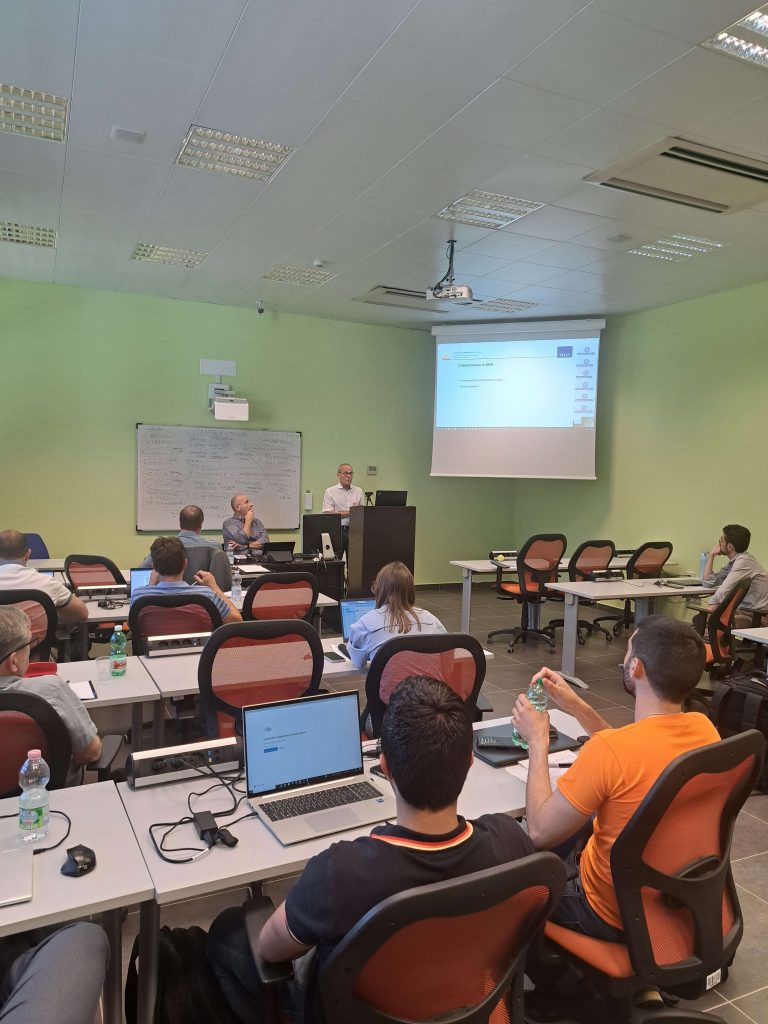
Jun. 13th, 2024.
Prof. Scherer Delivers Seminar on DEM/CFD Simulation at University of Salerno
Prof. Scherer gave a seminar at University of Salerno, Italy, on June 13 2024 on “DEM/CFD simulation of moving and reacting granular assemblies with gas flow”
(IPNF 2024)
Jun. 11th–12th, 2024.
Prof. Scherer Delivers Keynote on DEM/CFD Simulation at IPNF 2024 in Frankfurt
Prof. Scherer was a keynote speaker at the Modeling and Simulation Session during the International Powder & Nanotechnology Forum (IPNF 2024) in Frankfurt on June 11-12, 2024, entitled “DEM/CFD simulation of chemically reacting, thermally thick particles in moving granular assemblies with gas flow: challenges and recent developments.”
See website for IPNF 2023:https://ipnf2023.com/.
( CRC )
Jun. 1st, 2024.
CRC Granted for Another 4 Years
Great success: the CRC287 has been granted by the senate of the DFG for another 4 years until 30 June 2028.
Read these links for more info:
https://www.ovgu.de/Presse+_+Medien/Pressemitteilungen/PM+2024/Mai/PM+40_2024-p-139244.html
Soft skills lecture
Dec. 14th, 2023, 11:00-13:00
Soft skills lecture
Bookreading: Parenthood and science – (in)compatibilities, Corona Gaps and us.
During this lunch lecture, Dr. Sarah Czerney and Dr. Lena Eckert gave an insight into their books.
Sarah Czerney, Lena Eckert, Silke Martin (2022) Mutterschaft und Wissenschaft in der Pandemie: (Un-)Vereinbarkeit zwischen Kindern, Care und Krise, Verlag Barabara-Budrich-Verlag, ISBN: 978-3-8474-2654-7.
Sarah Czerney, Lena Eckert, Silke Martin (2020) Mutterschaft und Wissenschaft: Die (Un-) Vereinbarkeit von Mutterbild und wissenschaftlicher Tätigkeit, Springer Verlag, ISBN: 978-3658309312.
In order to explore the tension between parenthood, motherhood, other unpaid care work and science. After the lecture, participants had the opportunity for discussion.
Further reading:
Sarah Czerney, Lena Eckert, Silke Martin (Hg.): Mutterschaft und Wissenschaft in der Pandemie. (Un-)Vereinbarkeit zwischen Kindern, Care und Krise. Budrich: 2022
“Nähkästchen extended: Netzwerk Mutterschaft und Wissenschaft” – Podcast from University of Hamburg
“KARRIERE NUR OHNE KINDER?” – Interview with rbb kultur
“Ungleichheit bei Unikarrieren: Forscherinnen durch Pandemie benachteiligt” – Report in Tagesspiegel
Speaker
Dr. Sarah Czerney and Dr. Lena Eckert (Netzwerk Mutterschaft und Wissenschaft)
Soft skills workshop
Soft skills workshop
Dec. 13th, 2023
Workshop on “Gender appropriate candidate assessment” in Magdeburg by Dr. Steffi Nothnagel (Diversity Consulting)
The workshop addressed gender appropriate candidate assessment during recruitment processes. It presented strategies and good-practice examples on how to avoid gender bias within the recruiting process based on equal treatment of all applicants. Established approaches at both universities were discussed and evaluated with regard to opportunities for improvement.
INF-pilotgroup
Dec. 1st, 2023
INF-pilotgroup
A new INF-pilotgroup was created. Elected doctoral researcher from the research projects support their colleagues in the long term data storage of data.

Nov., 2023
Code and Data Sprint in Magdeburg
The Code and Data sprint was a two day event and took place in Magdeburg.
This CDC continued the first CDC in Berlin and further actions were undertaken to develop RDM in the CRC287. Data Management plans of the projects were updated by the doctoral researchers and example data sets were prepared. Further in-depth diving into the central data management platform Confluence was conducted. Group discussions with experts helped to answer urgent questions regarding RDM. In addition, the projects conducted several steps of internal review process to optimize the preparation and documentation of their datasets. Lastly, a pilot group for RDM was formed to support the CRCs data steward and their colleagues.
Jun. 22nd, Twente University, Netherlands
Lecture on “DEM/CFD simulation of reacting moving thermally thick particles” at Twente University
Prof. Scherer and Dr. Wirtz gave an invited lecture on “DEM/CFD simulation of reacting moving thermally thick particles” at Twente University, presenting newest results from the CRC 287.
The lecture took place in the course of the Multi-Scale Mechanics Seminar of the group of Prof. Luding.

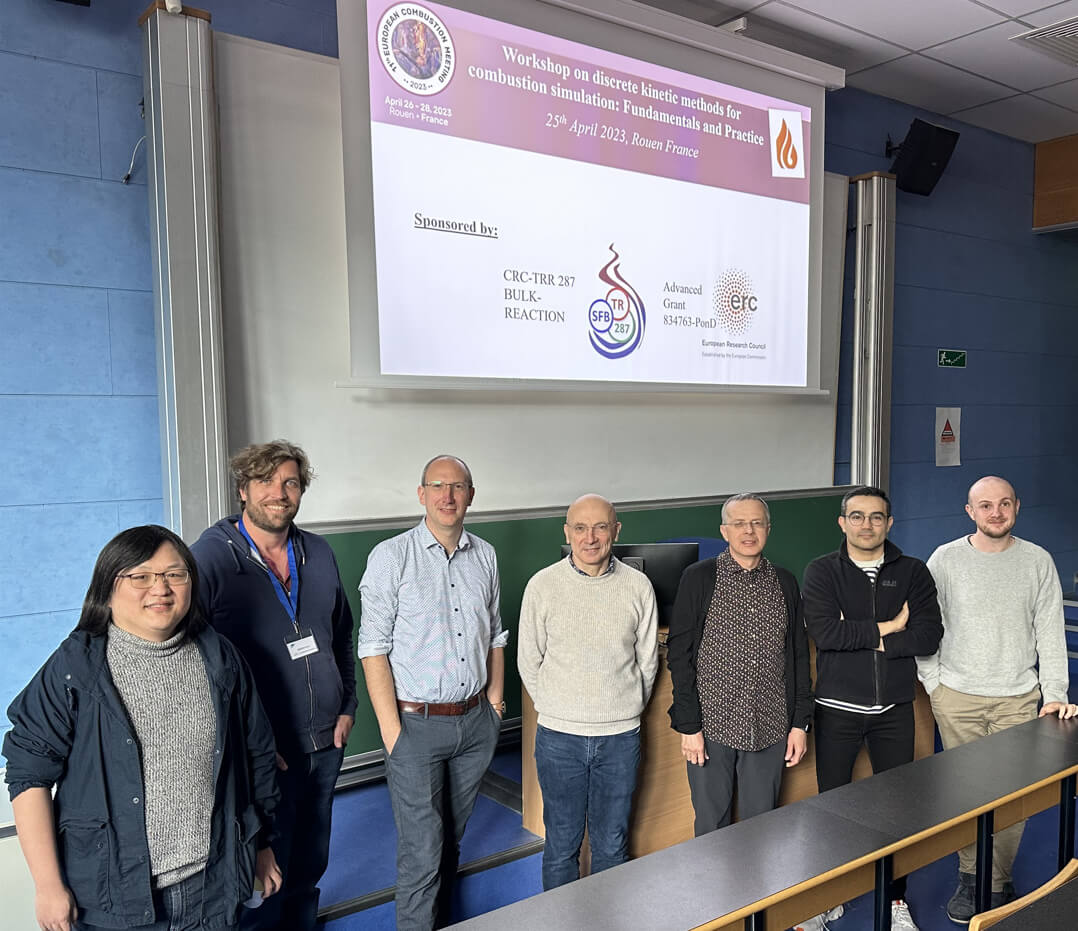
26- 28 April 2023 in Rouen, France
The CRC/TR 287 has organized a workshop at the 11th European Combustion Meeting (ECM) 2023:
Discrete kinetic methods for combustion simulation: Fundamentals and Practice
It is organized by Dr. Seyed Ali Hosseini.
Development of efficient and physically sound new algorithms adapted to the constantly evolving high performance hardware architecture is of the utmost importance, especially in computation-intensive applications such as combustion. Over the past decades the lattice Boltzmann method (LBM) and other kinetic- theory-based numerical approaches have proven themselves to be very efficient alternatives to classical Navier-Stokes-based solvers in the incompressible regime both on CPU- and GPU-based platforms. The rapid growth of industrial solvers based on the LBM is a clear testament to computational advantages of the latter. This success in the incompressible regime prompted the community at large to extend the scheme to compressible flows, and eventually combustion simulations. The past 5-10 years have witnessed a rapidly growing interest in the development of discrete kinetic methods for combustion simulations in both low and high Mach regimes.
The aim of this workshop, held in the context of the 2023 edition of the European Combustion Meeting in Rouen (France) is to gather experts in the area of the kinetic theory of gases and discrete methods based on the latter to discuss challenges and opportunities, recent progress and future of discrete kinetic methods for the simulation of reacting flows. The half day workshop included talks by experts in the field followed by short presentations from doctoral students and post-doctoral researchers illustrating most recent applications of discrete kinetic methods.
We warmly invite all interested parties to take part in this first edition of the workshop and, for those active in that area of research, submit abstracts to present their most recent progress. Accepted abstracts led to oral presentations of 5-10~mins in the last section of the workshop. Should the number of abstract be large, the possibility for poster presentation was also considered.

